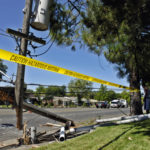Is Receiving Oral Sex Whilst Driving A Crime?

Australian porn performer, Angela White, recently revealed on a podcast that she was once involved in a car crash whilst performing oral sex on her driver.
And while the admission may raise the eyebrows of some, reports suggest that engaging in a sexual act such as fellatio, cunnilingus or digital penetration whilst driving is more common than many might think.
A 2014 study of college students in the United States found that just under 33% of men and 9.3% of women have engaged in sexual activity whilst driving (mostly oral sex), whilst 9% of men and 29% of women have engaged in sex in the passenger seat.
But what does the criminal law in New South Wales say about so-called ‘road head’?
Potential Offences
Drivers should be aware that engaging in a sexual act whilst driving can amount to any of a number of major traffic offences – which amount to criminal offences under the law – even if a collision does not occur and no one is injured or killed.
One of these offences is negligent driving, which is where a person behind the wheel falls below the standard of care to be expected of a reasonably prudent driver. This encompasses failing to keep a proper lookout, which one would expect could occur if receiving fellatio whilst driving.
Negligent driving that does not occasion death or grievous bodily harm is an offence under section 117(1)(c) of the Road Transport Act 2013 (NSW) (the Act) which carries a maximum penalty of $1100 and/or a 12 month driver licence disqualification.
The penalties are much more severe if another person sustains grievous bodily harm (GBH) or dies as a result of such driving – up to a fine of $2200 and/or 9 months in prison as well as an ‘automatic’ licence disqualification of 3 years that can be reduced to a minimum of 12 months for GBH, and and a fine of up to $3300 and/or 12 months behind bars plus an automatic disqualification of 3 years which can be reduced to 12 months where death is occasioned.
Another potential offence is reckless driving, which is where a person drives in a manner that, ”In a real sense potentially dangerous to a human being or human beings who as a member or members of the public may be upon or in the vicinity of the roadway on which the driving is taking place’.
Reckless driving is an offence under section 117(2) of the Act. This section outlines the offence of ‘reckless driving’, which carries a maximum penalty of:
- 9 months imprisonment, a 3 year licence disqualification and a $2000 fine, for a first offence; and
- 12 months imprisonment, a 5 year license disqualification and a $3000 fine if the accused has a history of offences.
The dangerousness of receiving oral sex whilst driving will depend greatly on the circumstances, including the amount of traffic at the time and the degree to which the driver was distracted, however it seems likely to be viewed as ‘reckless’ by a court, should a couple get caught in the act.
Very serious offences may apply if the amorous driver were to get into an accident, particularly if others were injured or killed. There are four main dangerous driving offences in NSW:
- Dangerous driving occasioning death under section 52A(1) Crimes Act 1900 (NSW), which carries a maximum penalty of 10 years imprisonment;
- Aggravated dangerous driving occasioning death under section 52A(2) Crimes Act 1900 (NSW), which carries a maximum penalty of 14 years imprisonment;
- Dangerous driving occasioning grievous bodily harm under section 52A(3) of the Crimes Act 1900 (NSW), which carries a maximum penalty of 7 years imprisonment; or
- Aggravated dangerous driving occasioning grievous bodily harm under section 52A(4) of the Crimes Act 1900 (NSW), which carries a maximum penalty of 11 years imprisonment.
Aggravated offences will apply, if at the time of the crash:
- You had more than 0.15 grammes or more of alcohol in 210 litres of breath or 100 millilitres of blood (high range drink driving);
- You were driving on a road at more than 45 kilometres over the speed limit;
- You were driving the vehicle to escape a police pursuit; or
- Your ability to drive was affected by an intoxicating drug (other than alcohol) or a combination of drugs (which may have included alcohol)..
What About The Passenger?
Although most NSW road rules apply to the driver of the motor vehicle, there are certain laws passengers must follow which may be broken in circumstances of oral sex whilst driving.
For example, passengers in motor vehicles must wear their seatbelt whilst the vehicle is moving under regulation 265 of the Road Rules 2014 (NSW). The regulation carries a maximum penalty of a $2200 fine if the matter comes before a court.
Indecent Exposure
Finally, both the driver and the passenger may find themselves on the wrong side of the offence of ‘indecent exposure’ under section 5 of the Summary Offences Act 1988 (NSW) which carries a maximum penalty of 6 months in prison and/or a fine of $1,100.
This offence applies if a person wilfully, obscenely exposes themselves in or within view of a public place or school.
A “public place” is defined extremely broadly as any area “that is open to the public, or is used by the public whether or not on payment of money or other consideration, whether or not the place or part is ordinarily so open or used and whether or not the public to whom it is open consists only of a limited class of persons”.
Whilst a care is not, in itself, a ‘public place’ being able to observe individual engaging in sexual activity through the windows means it is ‘within view’ of a public place.
Exposure will be ‘obscene’ if it likely to offend the standards of decency of the community. It seems likely that oral sex whilst driving will meet this threshold.






